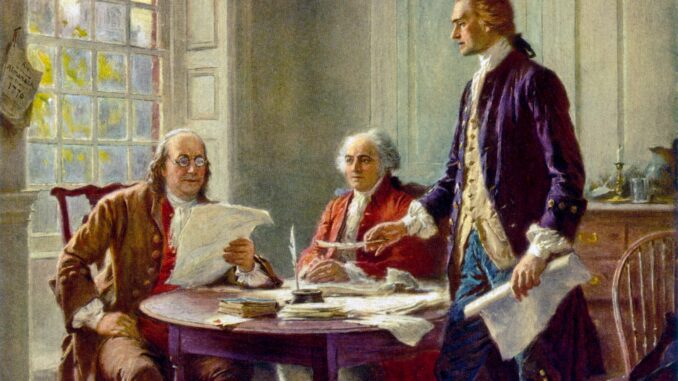

“Blessed is the nation whose God is the Lord.” — Psalm 33:12
“We hold these truths to be self-evident, that all men are created equal, that they are endowed by their Creator with certain unalienable Rights, that among these are Life, Liberty and the pursuit of Happiness.” — Declaration of Independence
As we reflect upon the founding of the United States of America, it is evident the principles and ideals upon which this nation was built. The Founding Fathers, in their wisdom and vision, drew inspiration from both divine truth and human reason, intertwining biblical principles with their pursuit of liberty and justice.
The Declaration of Independence, a foundational document of this great nation, boldly declares that all men are created equal and endowed by their Creator with certain unalienable rights. This profound statement echoes the teachings of the New Testament, which emphasizes the inherent worth and dignity of every individual as children of God. The apostle Paul reminds us in Galatians 3:28, “There is neither Jew nor Greek, slave nor free, male nor female, for you are all one in Christ Jesus.” This biblical truth affirms the equality and inherent value of every person, transcending social divisions and emphasizing our shared humanity.
The Founding Fathers recognized the importance of moral and ethical principles in governing a just society. They sought to establish a system of government that would secure the unalienable rights bestowed upon each individual by their Creator. Their belief in divine providence is evident in their writings and speeches. John Adams, one of the signers of the Declaration of Independence and later the second President of the United States, stated, “Our constitution was made only for a moral and religious people. It is wholly inadequate to the government of any other.”
The teachings of Jesus Christ and the principles of love, compassion, and justice found in the New Testament influenced the Founding Fathers’ vision for America. The concept of “unalienable rights,” which includes the right to life, liberty, and the pursuit of happiness, finds its roots in biblical teachings. Jesus proclaimed in John 10:10, “I have come that they may have life, and have it to the full.” The founders understood that true freedom and happiness are intimately connected to the pursuit of virtue and adherence to moral principles.
The signers of the Declaration of Independence, guided by both reason and faith, sought to establish a nation that would uphold the ideals of equality, justice, and freedom. Their reliance on divine wisdom and the biblical principles of love, compassion, and human dignity laid the groundwork for the United States of America.
Jesus taught us to seek justice, promote peace, and extend love to all. As we commemorate Independence Day, we should remember our dependence on God, who has granted us the privilege and responsibility of living in this land of freedom and opportunity.



